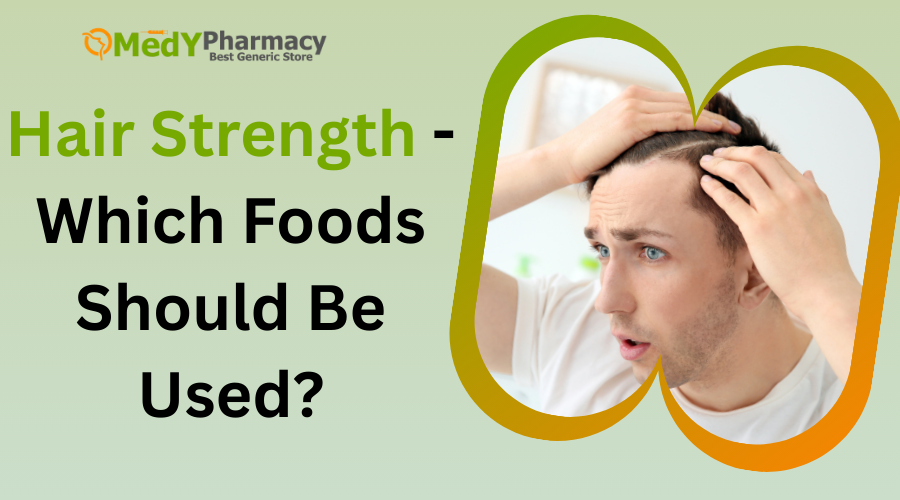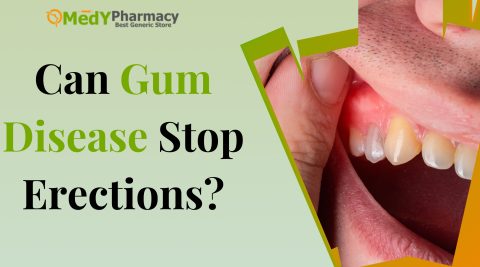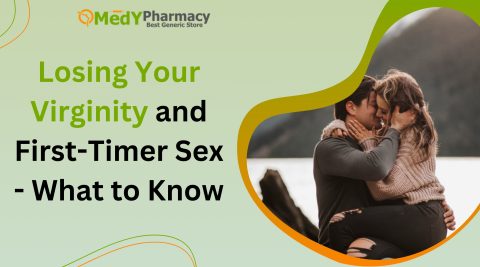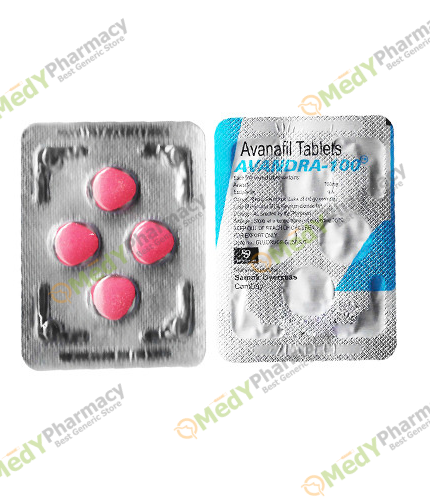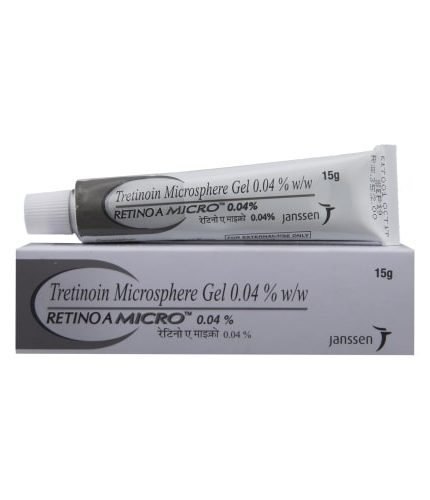Introduction:
Are you interested in improving your hair strength and avoiding significant hair loss and frontal baldness? It’s time for you to discover some methods that can help you get longer, smoother hair in addition to stronger hair.
It is fortunate to have strong hair. Be grateful for having thick, strong hair and take all the necessary steps to keep it that way. For those whose hair is weak.
Its inner core is more protein-enriched than that of those with thin hair, which explains why. The mane is strengthened and given a natural volume by the protein within.
You may experiment with more hairstyles since stronger hair has thicker fibres that are less likely to break or split.
Undoubtedly, your hair type and strength may differ, but that doesn’t mean you can’t improve your hair’s growth, feel, and health.
Your locks will be enjoying their best life if you follow the proper regimen and use strong hair tips. Continue reading to learn the secret to strengthening and thickening hair.
What Is Hair Strength?
Your hair’s ability to withstand damage, breaking, and shedding is referred to as its strength. It gauges the degree to which your hair strands can withstand stress from brushing, heat styling, or even exposure to the elements.
Keratin, a protein that makes up the majority of this, is what gives the hair shaft its structure. As a result, the outside layer, or cuticle, is smooth and undamaged, preserving the hair’s inner layers and retaining moisture.
It takes both external and internal care to strengthen your hair.
You should determine the causes of your hair loss and weakening and use hair care solutions that work to address them.
Avoiding or reducing hair damage from dangerous chemicals can be achieved by using natural hair care products. By oiling your hair and maintaining a healthy diet, it is well acknowledged that you may regain the strength your hair has lost. For strong hair, the daily diet must have enough proteins and minerals.
Taking a Daily Hair Mix
Frequently combing your hair properly is one of the easiest ways to improve the strength of your hair. There are two benefits to combing your hair. Initially, it is an excellent method of giving a head massage, which we have also discussed in the following parts.
Conversely, hair combing also guarantees consistent hair development and the removal of old, dry hair. The right hair combs should be used when combing your hair. Certain fungal infections of the scalp may be treated with medications like Mintop 10% Solution.
It’s a good idea to take a hair mix every day if you want to continuously promote hair growth, strength, and shine. Getting your body the nutrition it needs each and every day is the aim, regardless of whether you want a supplement blend or a natural DIY combination.
Signs of Hair Strength
How resistant your hair is to breakage, damage, and normal wear and tear is referred to as its strength. While weak hair is more likely to experience split ends, dryness, and thinning, strong hair feels and looks healthy, thick, and flexible.
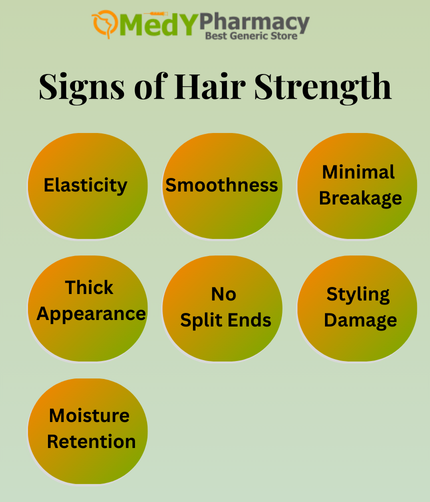
- Elasticity
It is mostly dictated by the equilibrium of moisture and protein in the hair shaft. Your strands’ elasticity indicates their flexibility and overall health.
It has been over-moisturised or over-processed if it stretches excessively and doesn’t bounce back.
- Smoothness
The cuticle layer, which is the outermost portion of your hair strand, is flat and aligned in smooth hair. Proper cuticle laying down makes your hair lustrous, silky, and resistant to frizz and tangling.
Your cuticle retains moisture and shields the inner parts of your hair while it is flat. It’s where smoothness begins. Less porous hair retains moisture and nutrients better, giving it a smoother texture.
Brushing and scalp massages can assist since sebum builds up and coats the hair shaft, increasing smoothness.
- Minimal Breakage
Breakage occurs when strands of hair break at any point along the shaft.
Cool hairstyles include buns, braids, and ponytails, but avoid wearing the same one every day or keeping it too tight.
Hair might become brittle and lifeless due to product accumulation. Use a deep conditioner after using a clarifying shampoo every few weeks to maintain the freshness of your hair and scalp!
- Thick Appearance
One of the best indicators of happy, healthy hair is a thick look, regardless of whether you’re attempting to create fullness or your hair is already dense.
If you take good care of your hair and style it properly, you may make it appear thicker even if it isn’t.
Goodly structured, stronger strands appear thicker. Incorporate protein treatments if your hair appears weak or lifeless.
- No Split Ends
Usually appearing at the tips, they might appear elsewhere along the strand if there is significant damage.
Cutting your hair every 8 to 12 weeks keeps splits from spreading up and damaging more of the strand, even if you’re growing it out.
A small amount of oil or serum applied to the ends helps keep them from fraying and locks in moisture.
Split ends cannot be “fixed” after they have occurred; they must be taken off. However, you can temporarily lessen their visibility by using bond sealers or smoothing serums.
- Styling Damage
Your hairstyle may make or destroy it, whether you use heat tools, chemicals, or tight hairstyles. Let us examine styling damage and discuss ways to keep your hair safe.
Your hair’s natural structure may be weakened, dried out, or broken down by various style techniques. This is known as styling damage.
Heat may dehydrate your hair and cause proteins (like keratin) to break down, lifting the cuticle and making your hair brittle and fragile.
Reducing breakage-related style damage requires this. Trim your hair every 6 to 8 weeks to maintain healthy ends and stop the damage from getting worse.
- Moisture Retention
Proper moisture retention keeps your hair nourished, strong, and healthy. Let’s examine the importance of moisture retention, its mechanisms, and ways to enhance it.
The capacity of your hair to retain water and moisture, which keeps it nourished, silky, and flexible, is known as moisture retention. Hair can become dry, brittle, and more likely to break if it isn’t properly hydrated.
Shea butter, coconut oil, jojoba oil, and argan oil are examples of natural oils that seal the hair cuticle and help retain moisture. To keep damp hair moisturised for longer, lightly oil it.
To increase absorption and trap heat, coat your hair with a shower cap after applying a deep conditioner and keep it on for 15 to 30 minutes.
Avoid Using Cosmetic Products on Your Hair
Try to limit the amount of time you spend using cosmetics on your hair. When worn over an extended period of time, these cosmetics severely harm hair quality and weaken the hair follicles that hold hair to the scalp.
Cosmetic hair extension products, hair colours, hair dyes, hair sprays, serums, and other products are examples of cosmetics that should not be used on your hair. We strongly advise you to use these goods as little as possible but not excessively.
If you are experiencing severe balding and hair loss, you can speak with your doctor about taking the Mintop 2% Solution.
Over time, a lot of cosmetic items can create a residue on your hair that can make it appear oily, flat, or lifeless. In addition to weighing down hair, this accumulation can block hair follicles and disrupt the hair’s normal development cycle.
Some chemicals in hair care products cause sensitivities or allergies in many people, which can cause rashes, redness, or irritation of the scalp. It can be wise to stay away from these items if you have sensitive skin in order to lessen irritation and inflammation.
Apply a tiny bit of oil to damp hair, paying special attention to the ends, to hydrate it and keep frizz at bay. Limit the amount of oil you apply once a week if your hair is prone to buildup.
Maintain Your Use of Medicated Shampoo
Instead of using any old shampoo on your hair, we advise you to use a medicated shampoo. Neem and aloe vera extracts, along with other natural components, are used in these therapeutic shampoos to strengthen and nourish your hair.
Using medicated shampoo products is also advised by doctors if you are experiencing early hair loss. Speak with the physicians to choose a good brand. You may apply the Hair 4U 2% Topical Solution after you’ve washed and dried your hair.
Causes of Hair Strength
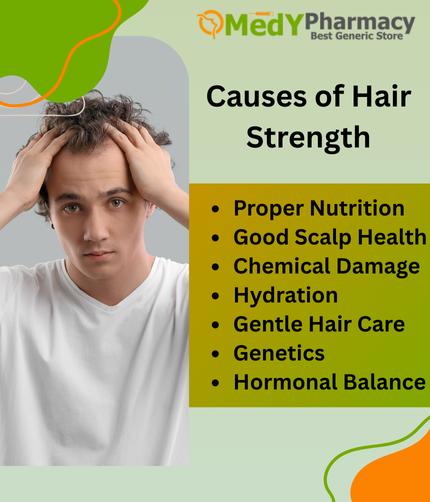
- Proper Nutrition
Eating a balanced diet that gives your body the vitamins, minerals, and proteins it needs to maintain healthy hair growth, strength, and moisture is the key to proper hair nutrition. Weak hair, thinning, dryness, or excessive shedding might result from poor nutrition.
Nutrients are crucial, but so is water! Dry, brittle hair that is more likely to break can result from dehydration. Maintaining the proper balance of moisture in your hair and scalp may be achieved by drinking enough water and eating meals high in water.
Start by adding a few nutrient-rich items to your meals if you feel like your hair needs a little more attention. Over time, you’ll notice the difference thanks to them, which are packed with vitamins and minerals that promote hair growth.
- Good Scalp Health
The basis for robust, healthy hair is a healthy scalp. An unhealthy scalp can impair hair development, result in excessive shedding, and create several scalp disorders, such as dandruff or itching. You should constantly prioritise taking care of your scalp since healthy hair begins at the roots!
The strength, thickness, and health of your hair are determined by the condition of your hair follicles, which are located on the scalp. A healthy scalp provides vital nutrients for healthy hair creation by promoting the best possible blood circulation to your follicles.
Overwashing can deplete the scalp of its natural oils, resulting in dryness. Shampooing is necessary to remove debris, excess oil, and product buildup.
- Chemical Damage
Exposure to strong agents that change the normal structure and health of hair can cause chemical damage. If common chemical treatments like colouring, relaxing, perming, and bleaching are not done correctly or too often, they can gradually damage hair.
Hair breakage, split ends, brittleness, and dryness can result from the damage.
Keratin is the main protein that provides hair its strength and structure. Chemicals are used to colour, straighten, or perm hair by first breaking and then changing the chemical bonds in the hair to produce the desired effect.
This might give your hair a fresh look, but it also damages the structure of your hair and removes natural oils.
- Hydration
For hair to remain strong and healthy, it is essential to stay hydrated. Your hair requires moisture, much like your skin, to be robust, silky, and manageable.
Maintaining proper hydration enhances the overall look, feel, and strength of your hair.
Seek deep conditioning solutions or conditioners made especially to replenish dry hair’s moisture content. Hydration may be increased by essential components, including glycerine, aloe vera, and hyaluronic acid.
Additionally, you may create your masks using products that are great at retaining moisture, such as avocado, coconut oil, honey, and olive oil.
You can maintain the smoothness and hydration of your hair by using hair serums that emphasise shine and moisture.
- Gentle Hair Care
Taking good care of your hair, preventing damage, and encouraging its health are the main goals of gentle hair care. A careful approach will keep your hair strong, lustrous, and less prone to breakage, frizz, and dryness, regardless of whether you have thick, fine, curly, or straight hair. Using the proper tools, methods, and routines to lessen the stress on your hair and scalp is crucial.
Hair may be quite sensitive, particularly if it’s damp or has been handled roughly or subjected to heat or chemicals. In addition to promoting healthy growth and lustre, gentle hair care helps you keep the integrity of your hair.
For the conditioner’s components to hydrate and repair the hair, leave it in for a few minutes.
- Genetics
The condition, growth pattern, colour, and texture of your hair are all greatly influenced by your genetic makeup. A person’s genetic composition affects their hair density, texture, growth rate, and susceptibility to hair loss.
Individual hair strand thickness is also determined by your DNA. Some individuals are born with thicker hair, which is often stronger and less likely to break, while others have finer hair, which is more sensitive and may break more easily.
Androgenic alopecia, or pattern baldness, is mostly caused by genetics. While women may experience scalp thinning, males usually have a receding hairline or balding at the crown.
- Hormonal Balance
An important factor in preserving the health of your hair is hormonal balance. Hormones affect your hair’s texture, thickness, and shedding patterns in addition to your hair growth cycle. Hormonal imbalances can cause thinning, hair loss, and texture changes, among other hair-related problems.
Your hair’s texture might be influenced by hormones. For instance, your hair may become finer, curlier, or drier due to changes in oestrogen and progesterone levels during pregnancy or menopause.
Hormonal imbalances result from PCOS, a disorder in which the ovaries create greater amounts of androgens.
Make Regular Use of Hair Conditioners
Using shampoo alone might not be enough to maintain a healthy hair care regimen. For this reason, we advise using a hair conditioner in addition to shampoo regularly. You should use hair conditioners, give your hair a good, gentle massage, and then wash your hair after washing.
Here’s how to take care of your hair properly and avoid any serious problems with hair loss. To find out if you need to use Hair 4U 5% Topical Solution you may also speak with the physicians.
Conditioners make it easy to comb or brush through your hair without damaging it by decreasing knots and snags. For long or curly hair that tangles easily, this is very helpful.
Conditioners give your hair a natural shine by smoothing the cuticle layer, which improves light reflection. Additionally, smoother, softer hair appears healthier and feels more opulent.
This smooths the cuticle of your hair, which keeps moisture in and makes your hair’s surface smoother, so reducing frizz.
Rinse your hair well with cool water when the conditioner has had a chance to do its job. By sealing the hair cuticle, the chilly water retains moisture and adds shine.
Will Hair Strength Be Increased By Home Remedies?
Indeed, one of the greatest methods for strengthening hair is to use natural therapies. Many locations treat scalp and hair problems using natural oils and drugs.
Further scientific study is necessary, though, and the only reliable sources of knowledge on these natural hair treatments are social media, the Internet, and friends and family.
Furthermore, the quality of these natural treatments and their substances is a major worry because they are regrettably not regulated by the government.
Is It Possible To Restore Hair Strength With A Nutritious Diet?
Yes, eating a nutritious diet every day can help you restore your hair’s strength. Another cause of hair loss is an insufficient diet. Inadequate dietary nutrient intake can lead to a number of hair-related problems.
Fortunately, you may increase the strength of your hair by adopting a healthier diet.
A diet rich in important vitamins, minerals, proteins, and fats that nourish the hair follicles and maintain optimal hair health will help encourage the growth of strong, healthy hair.
Additionally, its anti-inflammatory qualities contribute to the health of the scalp.
A healthy diet is a crucial starting point for regaining and preserving hair strength. You may encourage healthy hair development, increase its strength, and stop it from breaking by making sure your diet has a balanced combination of proteins, vitamins, and minerals. To get the best results, combine these dietary adjustments with additional hair care routines and good lifestyle choices.
What Foods Are Best for Hair Strength?
You must eat foods high in vital nutrients that enhance texture, lessen breakage, and encourage healthy hair development if you want to increase hair strength and general hair health. Here is a list of the top meals for strong hair, along with the essential elements they contain:
- Fatty Fish
These fish are abundant in vital nutrients that encourage healthy hair development, thicken hair, and nourish the scalp.
We must get these vital fats from our diet because our bodies are unable to create them on their own. These good fats, which are abundant in salmon, mackerel, sardines, and herring, support healthy hair follicles and a healthy scalp.
Omega-3 fatty acids help keep hair moisturised, minimise dryness, and encourage healthy scalp circulation. Additionally, they lessen inflammation, which might promote hair growth and lessen thinning.
Vitamin D, which is essential for the health of hair follicles and the hair development cycle, is abundant in fatty fish like salmon.
- Eggs
A great food to support hair growth, strength, and general health is eggs. Eggs are a great source of high-quality protein and other nutrients that help keep your hair strong, lustrous, and healthy by feeding the follicles.
Vitamin B called biotin, is necessary for strong hair. A great source of biotin, which aids in the synthesis of keratin, the protein that builds up hair, is eggs.
Biotin increases the general texture of hair, strengthens it, and lessens thinning. Hair loss and brittle hair are frequently associated with a lack of biotin.
- Avocados
In addition to improving hair structure and lowering the risk of frizz and dryness, these good fats also help keep hair hydrated.
By deeply hydrating the hair shaft, these fats increase the general strength and flexibility of hair.
Because they balance fluids and prevent dryness, avocados’ high potassium content helps keep your scalp healthy overall. Potassium keeps hair moisturised from the inside out.
This is crucial for avoiding split ends and brittle hair, and potassium keeps the moisture balance in check.
Frequent avocado usage can provide smoothness and lustre to dry, frizzy hair without the need for harsh chemical treatments.
- Potatoes
Vitamin C is a vital antioxidant that supports healthy hair and is found in good amounts in potatoes, especially white potatoes. Collagen is a protein that fortifies and preserves the structure of hair, and its synthesis depends on vitamin C.
Boiled potatoes make a delightful and nourishing salad when combined with your favourite vegetables, olive oil, and a little dressing.
By decreasing dandruff and dryness, the minerals in potato juice aid in enhancing scalp health and stimulate hair follicles, encouraging development.
Hair that is stronger, glossier, and more brilliant can result from including potatoes in your regimen, whether you consume them or utilise their juice in hair treatments.
- Citrus Fruits
One of the finest sources of vitamin C, which is essential for healthy hair, is citrous foods. As an antioxidant, vitamin C helps shield hair from free radical damage and oxidative stress.
Additionally, this is essential for the synthesis of collagen, a protein that fortifies and enhances the structure of hair.
The naturally high water content of citrous fruits is crucial for preserving the moisture balance in your hair and scalp as well as for keeping your hair nourished.
Hair that is dry, brittle, and prone to breaking can be avoided with proper hydration. Hydrated hair is smoother, glossier, and less likely to frizz out.
- Leafy Greens
Zinc is another mineral that is abundant in leafy greens and is essential for the growth and repair of hair tissue.
By avoiding dryness, dandruff, and other scalp disorders that can obstruct good hair development, the vitamins and minerals in leafy greens help maintain a healthy scalp.
You may prevent hair loss, encourage hair growth, and enhance the general health of your hair by consistently including these nutrient-dense veggies in your diet.
To get optimal hair health, include leafy greens in your diet on a daily basis, whether in the form of salads, smoothies, or cooked foods. Additionally, for deep nourishment and shine, these greens are excellent complements to do-it-yourself hair treatments!
- Nuts and Seeds
Keratin, the protein that builds up your hair, is made up of protein. Protein, which is abundant in nuts like cashews, almonds, and Brazil nuts, is essential for healthy hair development and strength.
Eating nuts and seeds high in protein helps maintain strong, healthy hair since a lack of protein can cause hair thinning and loss. These meals’ protein feeds hair follicles, promoting growth and reducing shedding.
Zinc maintains the healthy operation of the oil glands around hair follicles and aids in maintaining the structure of the hair follicles. Slower hair development and hair loss may result from a zinc deficit.
Nuts and seeds provide healthy fats that feed the scalp and hair, giving it a healthy, natural sheen.
- Whole Grains
One effective strategy to nourish your hair from the inside out is to include healthy grains in your diet. Whole grains, which are high in iron, zinc, fiber, and B vitamins, promote hair development, stop hair loss, and enhance the general health of hair.
You can provide your hair with the vital nutrients it needs to remain strong, glossy, and vibrant by including whole grains like oats, quinoa, brown rice, and barley in your meals.
Whole wheat pasta is a healthy option that has more fibre and minerals than white pasta.
- Water
One of the most crucial components of general health is water, which also plays a crucial part in preserving the vitality of hair. Your hair’s health and look are greatly impacted by maintaining proper hydration.
The efficient delivery of nutrients to the hair follicles is essential for hair development. Maintaining adequate hydration guarantees that your body can effectively deliver these nutrients to your hair follicles.
Hair follicle weakness brought on by dehydration may inhibit hair development and result in hair loss.
The Appropriate Dietary Nutrients for Increased Hair Strength
Ultimately, you want to consume the correct nutrients to strengthen your hair roots and get to the hair follicles.
Vitamins A, C, and E are among the vital elements that are necessary for boosting hair strength and density.
Increasing the amount of beta-carotene and antioxidants in your diet is also essential if you want to strengthen your hair.
You must rely on foods like carrots, which are high in beta-carotene and certain proteins, to provide these nutrients.
You may eat more spinach, eggs, milk, pumpkin, and sweet potatoes to boost your body’s consumption of vitamin A.
Without a doubt, you must rely on citrous fruits and some dry fruits like berries or cherries to increase your intake of this vitamin.
Even vitamin E is necessary for conditioning and fortifying your hair. You can depend on avocados, sunflower seeds, and almonds for this. We also advise you to frequently utilise the solution.
Don’t Use Hair Dryers
Avoiding hair dryer usage is a suggested strategy for strengthening your hair. Although hair dryers may dry your hair in a matter of minutes after a bath, the heated air that emerges from the dryer’s nozzle is bad for your hair follicles and overall hair quality. Patients who have been using hair dryers daily for years frequently complain of dry hair and hair loss problems.
Applying daily hair oil is undoubtedly one of the easiest ways to give your hair more nourishment and power. It is essential to do this either before or after taking a bath.
As you can see from this post, we have given you the greatest advice on how to strengthen and condition your hair that you can implement right now in your everyday hair care routine.
Only informative reasons are served by the information on our Medypharmacy. None of the medical advice and treatment is indispensable.







